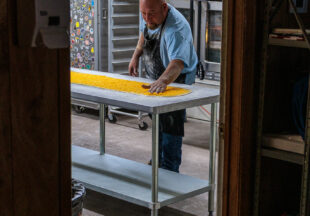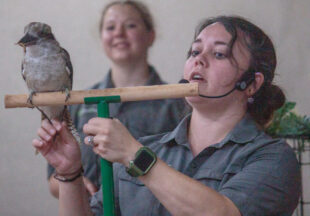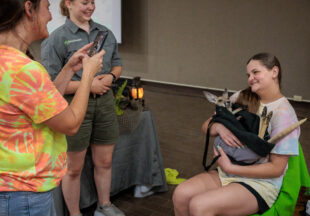Local teacher finds pain relief with surgery for rare condition

The first inkling Amanda Farmer had that something was wrong was about two years ago when her teeth started hurting. First, it was her bottom teeth, and then the top row started hurting.
At that time, the solution seemed simple — since the pain seemed to be with her teeth, the Breckenridge High School English teacher went to see her dentist. But, she had no idea what lay ahead.
In reality, painful teeth would be the least of her concerns. Sitting in the dentist’s chair, Farmer had no way of knowing that within a few months, she would have to make a decision about whether or not to have open brain surgery.
After the dentist told her the problem wasn’t originating with her teeth, Farmer went to an ear, nose and throat specialist to see if the pain could be caused by sinus problems. Again, according to the doctor, everything appeared to be normal for the wife and mother. But, she knew everything was not normal. She was in pain.
A diagnosis
Then, Farmer made an appointment with Cortney Berkley, a nurse practitioner at the Resource Care health clinic in Breckenridge. Berkley knew exactly what was going on with Farmer because she had treated another patient with the same symptoms.
Finally, Farmer had a diagnosis: trigeminal neuralgia.
Having treated other patients diagnosed with TN allowed the nurse practitioner to quickly come to Farmer’s aid with some answers.
According to the National Institute of Neurological Disorders and Stroke website, trigeminal neuralgia is a chronic pain condition that affects the trigeminal or fifth cranial nerve, one of the most widely distributed nerves in the head. It can cause “extreme, sporadic, sudden burning or shock-like facial pain that lasts anywhere from a few seconds to as long as two minutes per episode.”
Berkley’s first clues as to what was going on with Farmer were her symptoms. According to the NINDS, symptoms of trigeminal neuralgia include facial and/or head pain that “may range from sudden, severe, and stabbing to a more constant, aching, burning sensation. The intense flashes of pain can be triggered by vibration or contact with the cheek (such as when shaving, washing the face, or applying makeup), brushing teeth, eating, drinking, talking, or being exposed to the wind. The pain may affect a small area of the face or may spread.”
The disease was fresh on Berkley’s mind because she had treated another patient with it only a couple of months prior. Although the NINDS website estimates that about 12 new cases per 100,000 people are diagnosed each year, Berkley said it isn’t too unusual in a small town like Breckenridge.
Many factors could be involved in what causes trigeminal neuralgia. TN can be caused by a blood vessel pressing on the trigeminal nerve as it exits the brain stem, the deterioration of the trigeminal nerve’s myelin sheath, an injury to the trigeminal nerve or, in rare cases, nerve compression from a tumor, or a tangle of arteries and veins called an arteriovenous malformation, according to the NINDS.
Berkley specifically mentions the fact that it could all come down to an autoimmune problem.
Berkley’s advice for people who have a hard-to-diagnose illness/condition is to “be your own advocate.” If there is something wrong with someone, they will know it better than someone else. She advises people in the medical field to listen to their patients about their symptoms and problems.
Sharing the news
Armed with a diagnosis, Farmer’s next step was to tell her family the news. The discussion was not a huge issue, she said, since her husband, Wade Farmer, and their daughter, Addy, already knew something was wrong.
She was in too much pain to hide it from them. “I just cried all the time because it hurt so bad,” she said.
Even though the family knew something was wrong with Farmer, her daughter was 5 years old at the time of the diagnosis and was afraid she would lose her mother.
Farmer, too, had fears of her own. “I was completely terrified,” she said, crediting her husband with helping her get through everything. “He kind of held me together.”
Farmer also broke the news to her parents and in-laws, who were supportive and even did some research of their own.
Treatment

Amanda Farmer, an English teacher at Breckenridge High School, wanted to delay surgery until the summer, so that it did not affect her students. However, her doctor convinced her to go ahead with the surgery last December. (Photo by Tony Pilkington/Breckenridge Texan)
After being diagnosed, Farmer went to a neurologist she had previously seen for severe migraines. She tried a few different medicines to help with the pain, but they did not work for her.
Gamma Knife radiation was tried, but it did nothing except make her face numb, Farmer said.
Treatment options included surgery, which her husband and her doctor favored.
“I knew that (surgery) was a possibility as soon as I found out what I had because I did a lot of research on my own,” Farmer said.
So, about a year after the diagnosis, Farmer opted to have microvascular decompression (MVD) surgery, which the Mayfield Brain & Spine website defines as a surgery to relieve uncommon compression of a cranial nerve.
Although the surgery is a treatment for TN, it is not a permanent solution. Berkley said that she has had two patients who have had the surgery and that although it was successful, the symptoms did not stay away as long as her patients had hoped.
Farmer originally wanted to wait until the summertime to have the surgery because of her students. Evidence of her dedication to her role as a teacher fills her classroom, including projects from her students over the years and books, lots and lots of books. “I’m a teacher; my kids need me,” Farmer said she told her neurosurgeon.
But, the doctor talked her into going ahead with the surgery in December 2017, sooner than she had planned.
“I was to the point of not eating solid foods and was not functioning well,” Farmer said. “Insurance did play a big part of my decision, too.”
By not waiting, her insurance cover most of the expense of the surgery, which cost more than $100,000. With her insurance, Farmer met her out-of-pocket expenses within the first six months of last year with all of her doctor’s visits, neurologist visits, and three MRIs.
There were numerous risks associated with the surgery. There was a possibility Farmer could have died, had a stroke, or a cerebral spinal fluid leak could have occurred. “Brain surgery isn’t fun,” she said jokingly.
The restrictions immediately after the surgery included no lifting and no bending over. The recovery process takes a 18 months for a patient to fully heal from the surgery. Farmer’s memory, balance, and concentration ability were affected for a couple months following the surgery, and she is still in the recovery process.
The Mayfield Brain & Spine website states that MVD is extremely successful in treating TN with a relatively low risk of pain recurrence. Farmer estimates it will be between 5 and 20 years before the procedure will need to be done again on her left side.
However, the surgery didn’t cure all of Farmer’s TN issues. It turns out that she is one of the rare patients who have bilateral TN in which both sides of the face are affected at different times or at the same time.
“The right side of my face was diagnosed in July,” Farmer said. That means that she will have to repeat nearly everything she just went through.
Later this month, she will have another procedure to help, a balloon compression. “They’ll go through my face with a needle to the trigeminal ganglion and compress it with a balloon full of saline,” she explained.
The impact
Her daughter, Addy, was angry for a few days when she was told her mom had TN on her other side. Again, she was scared something would happen to her mom. For a while, Addy even had separation anxiety. “Whenever I have surgery again, (Addy) told me she was gonna take care of me,” Farmer said.
Before she gets another surgery, she plans to finish getting her Master of Education in Educational Leadership and Policy Studies.
From dealing with TN, Farmer has learned to know her limits and to say no.
“I can’t do everything,” she said. When she gets too stressed, her face starts to get worse. Learning restraint from overfilling her plate has helped her mentally and physically.
Dealing with TN and having the surgery forced Farmer to sacrifice her original graduation date because she had to skip three of her graduate classes. She is taking those classes this year and will graduate in the summer of 2019.
To help people with rare diseases, Farmer suggests that people try to be more understanding and realize that just because someone looks normal does not mean they are not dealing with a lot of pain. “People with invisible diseases are often dismissed,” she said.
Looking forward
A study at Yale University is focused on determining if there’s a genetic cause of TN. Farmer, her parents, and her brother sent DNA swabs into the labs at Yale University to help the study.
She said she hopes that if TN is identifiable by a genetic marker and if her daughter has the marker for the rare disease, she will have more options than Farmer has had.
“That terrifies me to think that she would have to go through the same kind of pain I’m going through or that she would have to have the same kind of surgery that I’ve had,” Farmer said.
Also to help with TN research, Farmer donates to a support group called the Facial Pain Association (FPA). The organization’s mission is “To serve those with neuropathic facial pain, including trigeminal neuralgia, through patient support, education for patients and medical professionals, and by promoting research to find a cure.”
The FPA website accepts donations, which go toward helping them fulfill their mission.
Amanda Farmer has been through a lot. Still, by persisting in her search for a diagnosis, getting the treatment she needed, participating in research studies and helping the experts find a cure for TN, she is setting a good example for others and working toward a better future for herself, her daughter and her students.
Story by Samantha Andis/Contributor to the Breckenridge Texan
Cutline, top photo: After multiple trips to several different doctors, Breckenridge teacher Amanda Farmer was finally diagnosed with trigeminal neuralgia, a chronic pain condition that can cause extreme facial pain. Last December, she had surgery to relieve the pain on the left side of her face, but because she has the bilateral form of the condition, she will eventually have to go through the same surgery for the right side. (Photo by Tony Pilkington/Breckenridge Texan)































































































